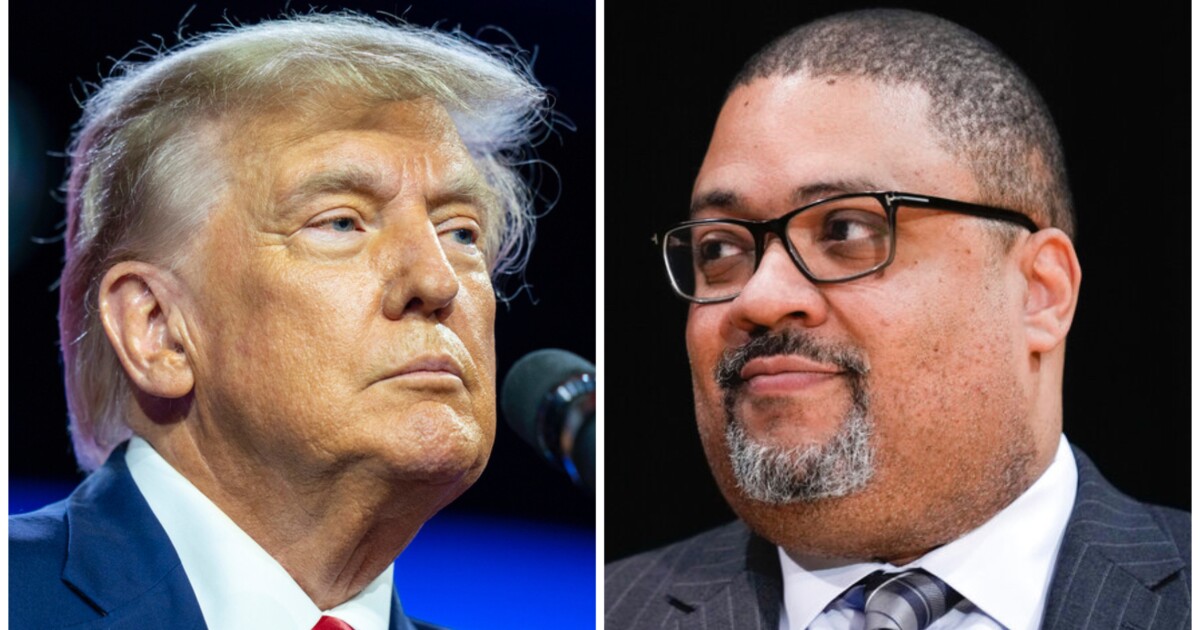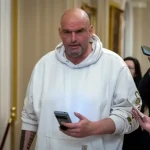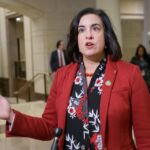

Donald Trump and Manhattan District Attorney Alvin Bragg squared off for the first time Tuesday as details about the unprecedented criminal indictment of a former president finally came to light.
The politically seismic event unfolded in front of crowds and hordes of media, commencing what is likely to become one of the most closely watched criminal proceedings in a generation.
FACT CHECK: DEMOCRATS DISTORT THE RECORD ON GUNS AFTER THE NASHVILLE SHOOTING
Trump and his legal team traveled to New York City for his arraignment on 34 felony charges of falsifying business records, before which he was processed into the system.
Here are seven takeaways from the day.
ALLEGED NEW EVIDENCE
Bragg told reporters after the arraignment that his office obtained new evidence to justify bringing the years-old case against Trump.
Bragg’s predecessor, Cyrus Vance, had worked on the investigation without ever bringing charges. Federal investigators too had examined the circumstances around Trump’s 2016 payments to a woman, Stormy Daniels, who claimed to have had an affair with him, and decided against pursuing an indictment.
Bragg said he had discovered “additional evidence that was not in the office’s possession prior to my time here,” which began last year.
That included, Bragg said, more witnesses. His allusion to new witnesses seemed to address a top critique of his case: that he has relied heavily on Trump’s former lawyer, Michael Cohen, as a star witness.
Cohen has previously lied to investigators and has spoken openly about his vendetta against Trump since the two parted ways bitterly during Trump’s presidency. Cohen is considered an unreliable witness.
In a statement of facts document, Bragg also mentioned the existence of audio recordings of conversations between Trump and Cohen that, the DA claimed, bolstered Cohen’s testimony.
However, those tapes have been public knowledge since 2018, when Cohen released at least some of the tapes through his lawyer to media outlets.
It is unclear why, nearly five years later, those tapes could provide support for a case no other law enforcement agency considered worthy of advancing.
“I’m sure that District Attorney Bragg has new facts,” Cyrus Vance Jr., Bragg’s predecessor, said on CNN when pressed on why Bragg may have decided to bring a case that he personally did not.
EXPERTS AREN’T IMPRESSED
Several legal experts panned the structure of Bragg’s argument as a stretch at best.
Containing few surprises, the text of the indictment released Tuesday reflected what public reports had signaled it might: Bragg used a novel hybrid of state and federal laws to bump up a misdemeanor charge, for which the statute of limitations had expired, to a felony.
The lawyers and former prosecutors who populated cable news panels Tuesday generally questioned the strength of Bragg’s claim that Trump violated federal election law.
In a press conference after the arraignment, Bragg said Trump had exceeded federal limits on campaign contributions. Federal investigators have already looked at that possibility, and they decided years ago not to prosecute Trump over it.
Bragg also claimed Trump had violated New York election law, but precisely how was less clear.
Elevating the misdemeanor charges of falsifying business records to the felonies Trump now faces would require Trump to have falsified the records in furtherance of a second crime, and few legal commentators seemed confident that Trump had actually committed any second crime.
In fact, Bragg did not charge him with one; he only referenced the additional alleged illegal activity.
UNANSWERED QUESTIONS REMAIN
How exactly Bragg plans to prove that Trump broke election law remains unclear.
Trump has not been charged with any actual violation of election law. But for Bragg’s indictment to work, prosecutors need to prove that he did commit a campaign violation.
Bragg’s office appears to have amassed substantial evidence regarding the paper trail of payments Trump made to Cohen to reimburse him for the money he’d sent to Daniels and to a tabloid that sat on the story of another woman.
The statute of limitations on improperly recording those payments as legal expenses has long passed.
And the evidence that Trump made those payments specifically to affect the 2016 race is thin, at least as represented in the documents made public Tuesday.
The statement of facts document does contain a line that alleges a political motive from Trump rather than a personal one.
“[Trump] instructed Lawyer A,” Bragg’s team wrote, referring to Cohen, “that if they could delay the payment until after the election, they could avoid paying altogether, because at that point it would not matter if the story became public.”
But the “emails and text messages” Bragg’s team goes on to cite as evidence for that claim do not include Trump; instead, those conversations were between Cohen, the tabloid’s editor, and another lawyer. And according to the court document, those conversations refer only to an effort to delay making the payments in question — not to the election.
TRUMP’S BIG DILEMMA
Trump’s legal team has already laid the groundwork to argue that Trump paid off women claiming to have had affairs with him because he wanted to shield his family from embarrassment, not because he wanted to advance his presidential bid.
That defense would conceivably be stronger if he acknowledged that the affairs did occur and that the disclosure of the affairs would have hurt his wife and young son.
But Trump has never publicly admitted to having sexual relationships with Daniels or the other women who came forward during the 2016 race. In fact, he has consistently denied the Daniels affair.
Hush money payments are not illegal. The only reason Bragg found cause to allege the payments were illegal was to connect them to Trump’s presidential ambitions at the time.
Trump is, in some ways, caught between an incentive to own up to the Daniels affair in order to strengthen his defense against the crux of Bragg’s case and to continue denying the affair to protect his family.
TRUMP DITCHED THE PRESHOW
While news reports had suggested Trump was eager to address the public both before and after his court appearance, Trump instead walked solemnly past reporters and said nothing.
Despite the presiding judge declining to impose a gag order, Trump stayed silent leaving the hearing as well.
Trump’s public demeanor — his stone-faced look and slow gait — seemingly contradicted claims from his aides and allies that he was unfazed by the indictment and even excited by the political opportunity it presents.
Trump returned immediately to Palm Beach, Florida, where he was slated to address supporters Tuesday evening.
BIGGEST MOMENT OF 2024 CAMPAIGN
Trump technically launched his 2024 presidential bid six months ago, but Tuesday was far and away the most attention his campaign has received to date.
Cameras captured his every move for the 24 hours leading up to his court appearance, from aerial footage of his plane preparing to leave Palm Beach on Monday to a live broadcast of the entire 4-mile drive from Trump Tower to the courthouse.
Political commentators dissected everything from his facial expression as he walked into the arraignment to the volume of his voice in the courtroom.
And the state of his primary campaign came under a blinding spotlight during round-the-clock coverage of the event, with few signs of that slowing down after Tuesday.
Whether all this is good for Trump’s chances of securing the GOP nomination remains unclear.
His indictment has so far united the Republican Party around him, at least for the moment; even his top potential rival, Gov. Ron DeSantis (R-FL), decried the criminal charges as unfair.
But as details of the case emerge and public opinion about the indictment solidifies, voters could begin to see the situation as more evidence that Trump comes with too much baggage to succeed as a Republican standard-bearer.
PEOPLE SEE THIS AS POLITICAL
Most people believe the criminal case against Trump is politically motivated — and most people also don’t care.
CNN polling data from this week showed that 76% of people believe politics played at least some role in the decision by Bragg to bring criminal charges against Trump.
The same poll also suggested that a majority of people — 60% of the country and an overwhelming share of Democrats — approve of the indictment.
CLICK HERE TO READ MORE FROM THE WASHINGTON EXAMINER
That lines up neatly with Trump’s overall approval numbers; a poll published shortly after he launched his 2024 presidential campaign found that 59% of people disapproved of him.
All this means most of the people who don’t like Trump welcome the fact that he’s facing criminal charges, even as they recognize the fact that the charges are motivated by partisanship.





